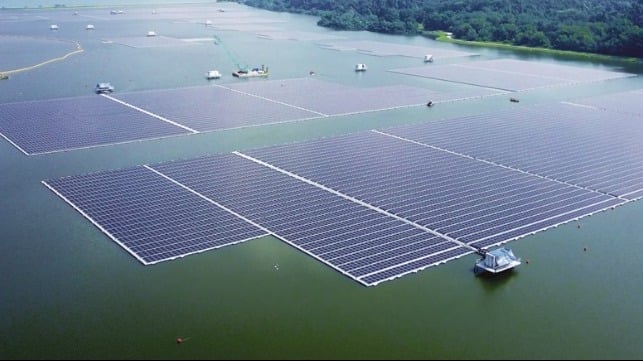Singapore Inaugurates One of the World’s Largest Floating Solar Farms

Singapore inaugurated one of the world’s largest inland floating solar photovoltaic systems, which is being used to convert the city-state’s water system to renewable power. The massive solar farm is part of the country’s plan to use solar energy as a key part of its efforts to reach its sustainability goals under the Singapore Green Plan 2030. The national plan calls for quadrupling solar energy deployment by 2025.
With 122,000 solar panels spanning across more than 110 acres, the installation was developed by Sembcorp Floating Solar Singapore, a wholly-owned subsidiary of Sembcorp Industries and National Water Agency PUB. The field has a peak production of 60 megawatts and makes Singapore one of the few countries in the world to entirely power its waterworks system with renewable energy.
The electricity generated from the solar farm will be sufficient to power Singapore’s five local water treatment plants, offsetting about seven percent of PUB’s annual energy needs and reducing PUB’s carbon footprint. It is expected to reduce carbon emissions by about 32 kilotons annually.
“The Sembcorp Tengeh Floating Solar Farm is a crown jewel in our portfolio and a showcase for Singapore,” said Wong Kim Yin, Group President & CEO of Sembcorp Industries. “Sembcorp has over 3,300 megawatts of renewable energy assets around the world. We are committed, and have the track record and competencies, to support the Singapore Green Plan.”
Construction of the floating solar PV system commenced in August 2020. Designed, built, owned, and operated by Sembcorp, the project incorporated new and innovative ways of working such as conceptualizing and implementing a new engineering and construction technique to design a custom-built jig that increased the rate of solar panel assembly by up to 50 percent.
Partnering with Quantified Energy Labs, a technology spinoff from the National University of Singapore, this project is also the first in the world to deploy advanced drone imaging to identify defects that could be caused by a variety of factors from the manufacturing to the installation stage. Identifying and replacing defective modules from the start has ensured that the PV system is running in optimal condition.
“With this floating solar power plant, which we believe to be one of the largest in the world, PUB takes a big step towards enduring energy sustainability in water treatment,” said Ng Joo Hee, Chief Executive of PUB. “Solar energy is plentiful, clean and green, and is key to reducing PUB’s and also Singapore’s carbon footprint.”
PUB’s main concern with deploying solar panels was the potential impact on the surrounding environment, biodiversity, and water quality. A comprehensive environmental impact study was carried out, showing no observable change in water quality nor a significant impact on surrounding wildlife. The farm was designed to minimize the impact on the water quality, flora, and fauna. Sufficient gaps between solar panels were incorporated to improve the airflow and allow sufficient sunlight to reach aquatic life. Additional aerators were also put in place to maintain oxygen levels in the reservoir.
The floats are made using high-density polyethylene that is recyclable, UV-resistant and corrosion-resistant.
No comments:
Post a Comment